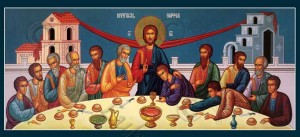Why do we need the Lord’s Supper?
As we examine our lives in the bright light of God’s holiness, we realize how much we have sinned and how much we need His forgiveness. Our sinfulness and the troubles, sorrows, difficulties and stresses of our life in this fallen world are all reasons we need the Lord’s Supper.
As great as is our need, even greater is the life-giving meal He has provided! It is a very personal way God works in our life to save us, to strengthen us and to keep us close to Him. Jesus promised to be with us always, to the very close of the age (Matt. 28:20). Through His precious Word and Sacraments, our Lord continues to fulfill His promise.
Our Lord Jesus Christ instituted the Sacrament of the Altar with these words: “This is My body, given for you. This cup is My blood of the new testament, shed for you for the forgiveness of sins” (Matt. 26:26-29; Mark 14:22-25; Luke 22:14-20; 1 Cor. 11:23-25). The Lord’s Supper “is the true body and blood of our Lord Jesus Christ under the bread and wine, instituted by Christ Himself for us Christians to eat and to drink” (Small Catechism).
Soul, adorn yourself with gladness, leave the gloomy haunts of sadness, come into the daylight’s splendor, there with joy your praises render. Bless the One whose grace unbounded this amazing banquet founded. He, though heavenly, high, and holy; deigns to dwell with you most lowly.
What is Jesus giving us in the Lord’s Supper?
In the Sacrament of the Altar our Lord and Savior is continually distributing to us the body and blood of the sacrifice
He made for us, the sacrifice by which He paid for the sins of the entire world. Thus, receiving His body and blood, we receive forgiveness, life and salvation. Flowing from these tremendous treasures of God’s mercy are the love, peace and hope that He gives us in His Supper, and the ability and desire to do God’s will, living in love and harmony with others.
It is often observed how there is a foreshadowing of the Lord’s Supper in the Old Testament discussion of how the sacrifices were eaten by those for whom they were offered (1 Cor.10:18). The Scriptures indicate that without the shedding of blood there is no forgiveness of sins (Heb.9:22). The blood of Jesus Christ, God’s Son, cleanses us from all sin (1 John 1:7;Matt.26:28;Acts 20:28;Rom.5:9;Heb.9:14;Heb.12:24; 1 Peter1:18-19;Rev.1:5;Rev.7:14). And it is this very blood He gives in His Supper.
Draw near and take the body of the Lord,and drink the holy blood for you outpoured; Offered was He for greatest and for least, Himself the victim and Himself the priest.
How is Jesus present in His Supper?
We do not try to explain how Jesus is present under the bread and wine of the Lord’s Supper, rather we believe, teach, confess and rejoice that He is present. We Lutherans let the words of Jesus stand without arguing about their possibility, or trying to explain how they are true. As Luther put it so clearly, “We maintain that the bread and the wine in the Supper are the true body and blood of Christ” (SA III.6). Everyone who communes receives into their mouths the body and blood of Jesus Christ, whether they believe it or not, be they worthy or unworthy.
Jesus’ Word is sure and certain. The Holy Spirit gives us faith to trust in and believe Jesus’ words, “Given and shed for you for the forgiveness of sins.” Faith in Christ’s promise is what makes us worthy to receive His Supper. Christ’s words of institution retain their validity and efficacious power and thus, by virtue of these words, the body and blood of Christ are truly present, distributed and received.
Your body and your blood, once slain and shed for me, are taken at your table, Lord, in blest reality. Search not how this takes place, this wondrous mystery; God can accomplish vastly more than what we think could be.
Why do we receive the Lord’s Supper often?
We receive the Lord’s Supper often because of how much we need what the Lord gives in His Supper. We dare never
make a law about how often an individual “should” or “must” receive the Lord’s Supper. But this is a separate question from how frequently Holy Communion is offered in our congregations. Our Lutheran Confessions make it clear that the Lord’s Supper is offered every Lord’s Day and on other days when there are communicants present (AC XXIV.34 and Ap.XXIV.1).
In saying this, our Confessions are merely reflecting the truth of the Sacred Scriptures,which place the Lord’s Supper at the center of worship (Acts 2:42; 20:7; 1 Cor.11:20,33), not as an appendage or an occasional extra. It is for this reason that our Synod has repeatedly encouraged our congregations to provide the opportunity for communicants who so desire to receive the Lord’s Supper every Lord’s Day.
My Lord, You here have led me within Your holiest place. And here Yourself have fed me with treasures of Your grace; for You have freely given what earth could never buy, the bread of life from heaven, that now I shall not die.
What should we do if we do not feel a need to receive the Lord’s Supper?
Because of our sinful human nature, we are tempted at times to think, “I don’t need to take Communion. I just don’t
feel like it. ”But when we feel this way, we need to realize that in the Lord’s Supper, the holy God of God, and Light of Light, very God of very God, is coming among us, under the bread and wine, to be with us, to join Himself to us, to forgive, renew and strengthen us.
In preparing to receive the Lord’s Supper, it is good for us to review, “Christian Questions with Their Answers,” on page 306 of our hymnal, Lutheran Worship. There Luther talks about those times when we just may not “feel” like receiving the Lord’s Supper. Luther writes, “To such a person no better advice can be given than that, in the first place, he put his hand into his shirt and feel whether he still has flesh and blood, and that he by all means believe what the Scriptures say about it in Gal.5 and Rom.7.
“Secondly, that he look around to see whether he is still in the world, and keep in mind that there will be no lack of sin and trouble, as the Scriptures say in John 15-16 and in 1 John 2 and 5.
“Thirdly, he will certainly have the devil also about him, who with his lying and murdering, day and night, will let him have no peace within or without, as the Scriptures picture him in John 8 and 16; 1 Peter 5; Eph.6; 2 Tim.2.”
O Jesus, blessed Lord, my praise, my heartfelt thanks to You I raise. You have so lovingly bestowed on me Your body and Your blood. Break forth, my soul, in joy and say; what wealth has come me today, what health of body, mind, and soul! Christ dwells within me, makes me whole.
Conclusion
Here is how one Lutheran theologian beautifully describes the precious treasure of the Lord’s Supper:
“The Israelites were fed with manna in the wilderness as with bread from heaven (Ex. 16:15). In this Holy Supper we
have the true manna which came down from heaven to give life to the world. Here is that bread of heaven, that angel’s food, of which if any man eat he shall never be hungry (John 6:35,51).
“The children of Israel had the ark of the covenant and the mercy seat, where they could hear the Lord speaking with
them face to face (Ex.25:21, 22). Here we have the true ark of the covenant, the most holy body of Christ, in whom are hidden all the treasures of wisdom and knowledge (Col.2:3). Here we have the true mercy seat in the precious blood of Christ (Rom.3:25), through which God has made us accepted in the Beloved (Eph.1:6). “Nor does Christ simply speak the word of comfort to our souls, He also takes up His abode in us. He feeds our souls not with heavenly manna, but, what is far better, with His own blessed self. Here is the true gate of heaven for our souls, and the ladder reaching from earth to heaven on which the angels of God ascend and descend (Gen.28:12).
“Christ holds us dear because He has bought us at so dear a price. He holds us dear because He feeds our souls with so dear and precious a food. He holds us dear because we are members of His body, of His flesh (Eph.5:30).
“The holy flesh of God, which the angelic hosts adore in the unity of the divine nature, before which archangels bow in lowly reverence, and before which the principalities and powers of heaven tremble and stand in awe, has become the nourishment for our souls. Let the heavens rejoice and the earth be glad (Ps.96:11), but still more let the believing soul exult and sing for joy, to whom God gives such an unspeakable gift!”
O Lord,we praise you, bless you, and adore you, in thanksgiving bow before you. Here with your body and your blood you nourish our weak souls that they may flourish. O Lord, have mercy!
— Dr. A.L. Barry
President
The Lutheran Church—Missouri Synod
(To download a PDF of this reading click here)


